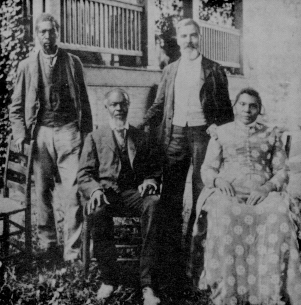Wessyngton Plantation was settled in 1796 by Joseph Washington (1770-l848) and African and African-American slaves he brought with him from Southampton County, Virginia. It was not unusual after the American Revolutionary War (1775-1783) for ambitious men to move their slaves from the wornout lands of the eastern slave-states to the cheaper and more fertile lands of the western territories like Tennessee (which, carved from western North Carolina, became a state on June 1, 1796). Joseph was a second-cousin to President George Washington, and Wessyngton is the Old English spelling of the Washington surname, which dates to A.D. 1260. Joseph Washington and his slaves were among the first settlers in Robertson County, Tennessee, to begin the cultivation of dark-fired tobacco. With the wealth generated by the black workers, the Wessyngton mansion was built in 1819 by slave labor and still stands on the original land.
After Joseph's death in 1848, the estate passed to his son, George Augustine Washington, Sr. (1815-l892). Under George's management and with the labor of even more African-American slaves, the estate was increased from 3,700 acres of land, seventy-nine slaves, and 15,000 bushels of tobacco in 1850 to 15,000 acres, 274 slaves, and 250,000 bushels of tobacco by 1860. A year before the Civil War, Wessyngton became America's largest tobacco plantation and the world's largest single producer. The outbreak of the Civil War in mid-1861, however, brought operations at Wessyngton to a halt. Despite the empty rhetoric and boasting of Tennessee's minority Confederates, the Union army and pro-Union citizens quickly took control of Middle Tennessee in early 1862. Many of Wessyngton's black men enlisted with the Union army after the office for the
 recruitment
of United States Colored Troops (USCT) opened at Nashville in September
of 1863. After the war and the Emancipation, many of the USCT returned
to their families and to Wessyngton to farm. Because the Washingtons never
sold any of the slaves from the plantation, the African American families
remained intact through recent times. As many as five generations of black
families lived at Wessyngton at the same time, and many of them continued
after slavery to use the Washington surname.
recruitment
of United States Colored Troops (USCT) opened at Nashville in September
of 1863. After the war and the Emancipation, many of the USCT returned
to their families and to Wessyngton to farm. Because the Washingtons never
sold any of the slaves from the plantation, the African American families
remained intact through recent times. As many as five generations of black
families lived at Wessyngton at the same time, and many of them continued
after slavery to use the Washington surname.
In the above copy of an 1892 photograph, the writer of this article identified four Wessyngton servants, all former slaves and relatives of the writer. From left to right are Allen Washington (b.l825; head dairyman), Emanuel Washington (b.1824; the cook), Granville Washington (b. 1831; body servant to George A. Washington), and Hettie Washington (b.1839; head laundress and Emanuel's wife).
The Wessyngton Plantation remained in the hands of direct white descendants of the original settler until 1983. Then the estate was sold to Glen and Donna Roberts. Wessyngton is located in Cedar Hill, Tennessee, about thirty-five miles northwest of Nashville.
In 1964, the Washington family deposited family records in the Tennessee State Library and Archives in Nashville. These records span the seventeenth through the twentieth centuries and are stored on nearly seventy rolls of microfilm. The records yield valuable information on the lives of African Americans before the Civil War, providing a wealth of data on black genealogy, as well as black life on one of Tennessee's premiere plantations. Indubitably, plantation history is important for the reconstruction of black family history and genealogy in Tennessee.